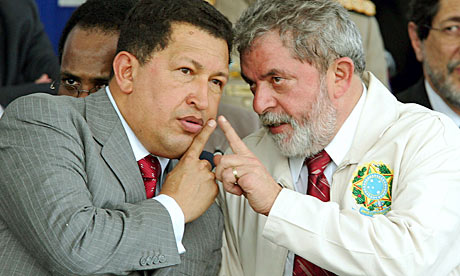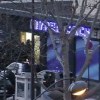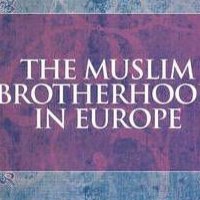![]()
Sun, Jan 16, 2011 | WikiLeaks

US annoyed over then president Lula's friendship with Venezuela's president Hugo Chávez . (Photo: Evaristo Sa/AFP/Getty Images)
WikiLeaks: Brazil Denied Existence of Islamist Militants
Document: Brazil’s government covered up the existence of Islamist terrorist suspects in São Paulo and border areas in an apparent bid to protect the country’s image, according to secret US documents released by WikiLeaks.
The administration of former president Luiz Inácio Lula da Silva publicly denied that militant Islamists were active in Brazil, even while its law enforcement agencies co-operated closely with the US in monitoring suspects.
“Despite publicly expressed sentiments of high-level officials denying the existence of proven terrorist activity on Brazilian soil, Brazil’s intelligence and law enforcement services are rightly concerned that terrorists could exploit Brazilian territory to support and facilitate terrorist attacks, whether domestically or abroad,” said a US embassy cable.
Read related article “Brazil denied existence of Islamist militants, WikiLeaks cables show” in the Guardian here.
Source: WikiLeaks
Friday, 02 October 2009, 21:25
S E C R E T SECTION 01 OF 04 BRASILIA 001216
SIPDIS
DEPARTMENT FOR S/CT SHARI VILLAROSA AND WHA.
EO 12958 DECL: 10/02/2019
TAGS PREL, PGOV, PTER, PINR, BR
SUBJECT: BRAZIL: SCENESETTER FOR OCTOBER 5-7 VISIT OF S/CT
DEPUTY COORDINATOR OF REGIONAL AFFAIRS SHARI VILLAROSA
REF: A. A. BRASILIA 01206 B. B. BRASILIA 00156 C. C. BRASILIA 01095
Classified By: Political Counselor Steve Liston, reason: 1.4 (b) and (d )————-
Introduction
————-
1. (C) The relationship between the United States and Brazil is as productive and broad-based as it has ever been in recent decades, the result of the cordial personal connection already established between President Obama and President Luiz Inacio Lula da Silva, which is building on Lula,s excellent relationship with former President Bush. New cooperation mechanisms on biofuels, business issues, and economic matters, and our shared goals of fostering hemispheric stability, promoting democracy, developing a consensus on next steps for climate change, and achieving a mutually satisfactory conclusion to the Doha round of WTO negotiations have fostered the view in Brazil that relations between our two countries are closer than ever. Brazil appears to be headed for a rapid recovery from the effects of the global financial crisis, and Lula remains as popular as ever as the country turns its focus on the race to succeed him in January 2011.
2. (C) Internationally, U.S.-Brazil cooperation is often limited by the GOB,s unwillingness to speak out against anti-democratic actions in the hemisphere (Venezuela and Cuba), take proactive steps to address key issues such as nuclear nonproliferation and counterterrorism concerns, and expand its international leadership in meaningful ways. However, military-to-military relations are good and growing, and most of the Brazilian military understands the potential benefits of partnership with the United States. At the operational level, cooperation on law enforcement issues, such as counternarcotics, container security, and intelligence sharing, is excellent and improving. As the most senior official in S/CT to visit Brazil in several years, your visit provides an opportunity to highlight the importance of a regional approach to counterterrorism efforts and to explore new avenues for cooperation in that field.
——————–
Counterterrorism: Operational Partnership, Policy Intransigence, Legal Weakness
——————–
3. (S) The primary counterterrorism concern for both Brazilian officials and the U.S. Mission in Brazil is the presence and activities of individuals with links to terrorism-particularly several suspected Sunni extremists and some individuals linked to Hizballah-in Sao Paulo and other areas of southern Brazil. Despite publicly expressed sentiments of high-level officials denying the existence of proven terrorist activity on Brazilian soil, Brazil,s intelligence and law enforcement services are rightly concerned that terrorists could exploit Brazilian territory to support and facilitate terrorist attacks, whether domestically or abroad, and have focused their efforts in the areas of Sao Paulo, where the vast majority of Brazil,s estimated 1.2-1.5 million Muslims live; Brazil,s tri-border areas with Argentina and Paraguay and with Peru and Colombia; and its borders with Colombia and Venezuela. Brazil,s recognition of the potential threat from terrorism prompted a reform of the Brazilian Intelligence Agency (ABIN) that raised the profile of the issue by upgrading the counterterrorism division to the department level and establishing the Brazilian Intelligence System (SISBIN)-an NCTC-like entity within ABIN to coordinate intelligence gathering and sharing across the GOB.
4. (C) During an early July 2009 hearing before a Congressional committee (ref A), the Brazilian Federal Police,s head of intelligence publicly admitted that XXXXXXXXXXXX had performed duties for the terrorist group, ranging from propaganda, to logistics, recruitment, and other activities. Because Brazil lacks counterterrorism legislation, the DPF arrested him on charges of hate crimes, which carry a much lighter sentence.
5. (SBU) The Brazilian government continues to be a cooperative partner in countering terrorism and related activities that could contribute to the facilitation of attacks in the region or elsewhere-to include investigating potential terrorism financing, document forgery networks, and other illicit activity. Operationally, elements of the GOB responsible for combating terrorism — the Federal Police, Customs, and to a lesser extent ABIN — effectively work with their U.S. counterparts and diligently pursue investigative leads provided by U.S. intelligence, law enforcement, and financial agencies regarding terrorist suspects. The senior levels of the Brazilian government, however, publicly deny the possibility that terrorist groups or individuals connected to such groups operate or transit through Brazilian soil and vigorously protest any claims made by U.S. authorities to that effect.
6. (C) The Brazilian government and non-government elite shows particular sensitivity when USG officials raise a key issues, including the re-establishment of the Fourth Fleet, sovereignty over their recent off-shore sub-salt oil discoveries and the Amazon, and the status of indigenous people and lands. Terrorism and the Argentina-Brazil-Paraguay Tri-Border Area (TBA) are also sensitive in government circles.
— Terrorism. Officially, Brazil does not have terrorism inside its borders. In reality, several Islamic groups with known or suspected ties to extremist organizations have branches in Brazil and are suspected of carrying out financing activities. Although there is good working-level law enforcement cooperation between the U.S. and Brazil on terrorism related activities, the official position of the government is to deny that Brazil has any terrorist activity.
— Tri-Border Area (TBA). Related to the above, Brazilian officials rebuff any suggestion by U.S. officials that there is terrorist activity in the TBA. A frequent Brazilian retort to comments about the TBA is, “Which one? We have nine tri-border areas.” As we are generally unable to share intelligence regarding terrorism-related activities, the USG is regularly accused of making unsupported assertions that malign TBA residents and have a negative impact on tourism in the region. The GOB insists there is no proven terrorist activity in the TBA and, in its defense, points to statements to that effect in the repeated joint communiques out of the annual 3 Plus 1 meetings.
7. (SBU) Brazil,s overall commitment to combating terrorism and the illicit activities that could be exploited to facilitate terrorism is undermined by the GOB,s failure to significantly strengthen its legal counterterrorism framework. Two key counterterrorism-related legislative initiatives continued to languish in 2009. An anti-terrorism bill that would have established the crime of terrorism and other associated crimes was drafted but shelved before its introduction in Congress and a long-delayed anti-money laundering bill has not been approved by Congress. If passed, the latter bill would facilitate greater law enforcement access to financial and banking records during investigations, criminalize illicit enrichment, allow administrative freezing of assets, and facilitate prosecutions of money laundering cases by amending the legal definition of money laundering and making it an autonomous offense.
——————–
Counterterrorism: Making the 3 Plus 1 Work
——————–
8. (C) The 3 Plus 1 Mechanism (ref b) on Security in the TBA of Argentina, Brazil, and Paraguay remains, six years after its initial plenary session, the only instrument available to discuss CT with regional partners at the policy level. Given
BRASILIA 00001216 003 OF 004
the likelihood that the Foreign Ministry (Itamaraty) will reject new policy-level proposals for regional security cooperation as the GOB focuses on building up a regional security architecture in South America that does not include the United States (i.e., Mercosul working groups on security, UNASUL, South American Defense Council), re-invigorating the 3 Plus 1 becomes all the more necessary, both as a means of achieving meaningful policy-level commitments from Brazil on this important issue and as a way of maintaining a foothold in regional security discussions. The United States, turn to host the upcoming 3 Plus 1 offers the best opportunity since the initial plenary to shift the dynamics of the mechanism in a way that ensures its effectiveness and our broader security interest in the region. Taking advantage of greater GOB openness to the new U.S. Administration, a concerted USG strategy to implement this new approach that includes careful inter-agency preparation and high-level participation could lay the groundwork for the GOB to accept expanding the scope of the 3 Plus 1-substantively, geographically, or both-to make it a more effective regional security dialogue.
9. (C) The history of the 3 Plus 1 suggests that it will require careful planning and execution to make it a truly effective forum for cooperation. The Brazilians have been consistent in limiting discussions on topics that are not within the established and narrow confines of the 3 Plus 1 (only counterterrorism, only TBA), and have made it nearly impossible for the USG to propose projects for the four partners to undertake jointly.
10. (C) During SouthCom Commander General Douglas Fraser,s visit to Brazil July 29-31 (ref c) Foreign Ministry Under Secretary for Political Affairs I Amb. Vera Machado said Brazil,s “great concern” was the control of transnational illicit activities, nothing that this area is very sensitive, as it is seen by some as having this potential to lead to external interference in domestic affairs. Foreign Ministry Transnational Crimes Director Minister Virginia Toniatti raised the 3 Plus 1 security forum for the TBA, noting that WHA DAS Chris McMullen had struck the right tone in their January 2008 meeting by not speaking about terrorism in the border but rather talking about broader illicit activities. (Comment: This is the same person who in the past has often insisted that 3 Plus 1 could discuss nothing but counterterrorism, and who has effectively derailed productive dialogue at the 3 Plus 1 meetings. End comment.) Stressing how much she disliked the term “tri-border area,” as it suggested an uncontrolled area when in fact each country exercised control up to its own borders, Toniatti nonetheless said that Brazil is ready to work with its neighbors and the United States in a concrete way to address confirmed illicit activities. She rejected unsupported assertions made by USG officials of support for terrorist activity in the region, which only serve to stigmatize it. She noted that there had so far been no evidence of terrorist activity or finance in the region and that all of the 3 Plus 1 declarations had explicitly states as much.
11. (C) Despite these difficulties, the 3 Plus 1 mechanism serves several important purposes. Policy-level dialogue: Although law enforcement cooperation with Brazil has always been excellent and fluid at the operational level, 3 Plus 1 is the only sub-regional discussion on these issues in which we participate at a policy level. Networking: Members of the Mission,s Law Enforcement Working Group (LEWG) — which includes DEA, DHS (ICE, CBP, and USSS), DOj (FBI, RLA), DOD (DAO, MLO), and State — who have attended the 3 Plus 1 sessions see value in the networking possibilities created through the mechanism. Accountability: The 3 Plus 1 allows us the opportunity to question Brazil and other partners as to what progress they have made to comply with basic international norms, and to remind them of their international obligations. Information sharing: Mission believes much of this information is valuable for understanding what the GOB is doing independently and jointly with its neighbors, not all of which is information we receive through other contacts or in the vetted and open way in which it is reported at 3 Plus 1. Moral suasion: Brazilian government officials repeatedly cite their participation in the 3 Plus 1 as a measure of their commitment to combat terrorist activity in the region. To the extent that GOB puts value on the 3 Plus 1, it provides some leverage to encourage
BRASILIA 00001216 004 OF 004
Brazil to be a positive partner.
12. (C) As a result of these benefits, Mission Brazil believes 3 Plus 1 mechanism should be maintained. But we also need to look for ways to make it more effective. We see two main options for improving the mechanism: a somewhat simpler but less satisfactory evolution to a broader TBA agenda, or a more difficult and ambitious effort at restructuring the 3 Plus 1 into a country-wide counter-crime forum. (See ref C for more detail on Mission proposals.)
——————–
Moving Forward on CT Cooperation
——————–
13. (C) High-level, long-term USG commitment to engaging Brazil on counterterrorism, including in the 3 Plus 1, will be necessary to build a productive CT relationship above the operational level. Although we expect limited results until a new GOB Administration takes office in 2011, your visit provides an excellent opportunity to reiterate the high priority that the Obama Administration gives to this issue, frame the discussion toward a more productive relationship, and explore possibilities for policy-level cooperation.. Your visit also serves as an opportunity to push U.S. goals and regain momentum in advance of the upcoming 3 Plus 1 meeting. KUBISKE



 RSS
RSS











#WikiLeaks: #Brazil Denied Existence of #Islamist #Militants | #US http://j.mp/idG4La
RT @CrethiPlethi: #WikiLeaks: #Brazil Denied Existence of #Islamist #Militants | #US http://j.mp/idG4La
RT @CrethiPlethi: #WikiLeaks: #Brazil Denied Existence of #Islamist #Militants | #US http://j.mp/idG4La